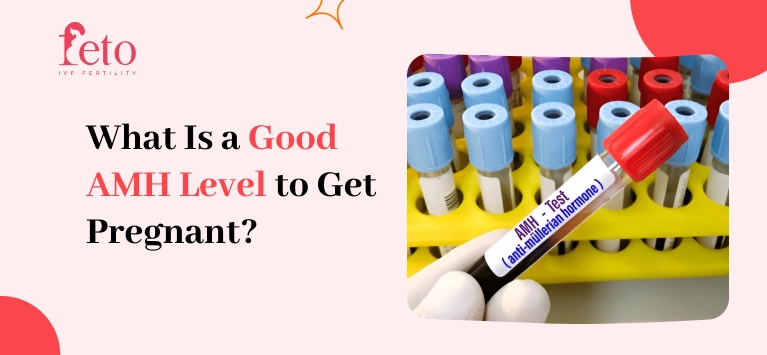
What Is A Good Amh Level For Ivf?
Key Facts
- Normal AMH: 1 to 4 ng/mL
- AMH naturally declines from your mid-20s
- Low AMH ≠ Infertility: Having low AMH doesn't mean you can't get pregnant
- Birth control may suppress but does not lower AMH levels
Trying to conceive?
If you’re planning a pregnancy and have come across the term AMH in your fertility journey, you’re not alone. AMH, or Anti-Mullerian Hormone, plays a crucial role in understanding your ovarian reserve, basically, how many eggs you have left.
So, what AMH level is considered ideal for getting pregnant? And does a low AMH mean your chances are gone? Read on to learn more.
What Is AMH?
Anti-Mullerian Hormone is produced by small follicles in your ovaries that contain immature eggs. You can think of AMH as a quick picture of your current egg reserve.
- Higher AMH often means you still have a good supply of eggs.
- Lower AMH may suggest fewer eggs remain.
- However, AMH doesn’t reflect egg quality, which also plays a vital role in conception.
So it’s a helpful tool but not the full story.
AMH Blood Test
The AMH blood test can be taken on any day of your menstrual cycle. No fasting is required. It’s often recommended along with other tests like FSH (Follicle Stimulating Hormone) or antral follicle count (AFC) to assess your fertility.
AMH Ranges & What They Mean
Here’s a general guideline of AMH levels for adult women:
| AMH Level (ng/mL) | Interpretation |
|---|---|
| < 1.0 | Low reserve |
| 1.0 – 4.0 | Normal/Healthy |
| > 4.0 | High/May indicate PCOS |
Note: These ranges may vary slightly depending on the lab, but they’re widely used for clinical guidance
AMH Levels by Age
AMH naturally declines with age. Here’s a general breakdown:
| Age | Average AMH Level (ng/mL) |
|---|---|
| 25 | 3.0 – 5.0 |
| 30 | 2.5 – 4.5 |
| 35 | 1.5 – 3.5 |
| 38 | 0.8 – 2.0 |
| 40+ | 0.5 – 1.0 |
By the age of 40, AMH levels typically fall below 1.0 ng/mL. But many women still conceive naturally or through assisted methods at this stage, especially with guidance from a fertility specialist.
Pregnancy With Low AMH
A low AMH level might feel discouraging, but it doesn’t mean pregnancy is out of reach.
Women with low AMH can still ovulate regularly. Many have conceived naturally, especially if under 35.
In IVF, lower AMH might mean fewer eggs retrieved but one high quality egg is often enough.
The key takeaway? AMH gives insight into quantity, not quality. So don’t panic. Talk to your doctor about next steps and possible options.
When “Too Much” AMH Signals PCOS
An AMH level above 5.0 ng/mL could suggest Polycystic Ovary Syndrome (PCOS), especially if combined with irregular periods or excess androgens.
In PCOS:
- Egg reserve may appear high
- Ovulation may be irregular or absent
There’s a higher risk of immature eggs or hormonal imbalance
If you think you might have PCOS, it’s important to get a full evaluation from a specialist. Treatments can help regulate cycles and support pregnancy.
Factors That Influence AMH
While age is the biggest factor, other things can affect your AMH levels:
- Smoking: Linked to lower AMH.
- Chemotherapy or radiation: May significantly reduce ovarian reserve.
- Obesity or underweight: Can skew results.
- Vitamin D deficiency: There’s growing evidence that it may be linked to reduced AMH.
- Birth control pills: May temporarily suppress AMH but don’t impact long-term fertility.
Evidence Based Ways to Support Ovarian Reserve
You may not be able to increase AMH, but you can support fertility in meaningful ways:
- Maintain a healthy weight
- Take supplements like Coenzyme Q10, Omega-3s, and prenatal vitamins
- Limit stress through yoga, mindfulness, or therapy
- Avoid smoking and alcohol
- Get enough sleep and eat a nutrient-rich diet
If pursuing IVF, doctors can prepare your stimulation protocol even with low AMH to optimize results.
Time to Call the Experts
When should you consider visiting a fertility specialist?
- If you’re under 35 and trying for 12 months with no success
- If you’re 35 or older and trying for 6 months
- If you’ve been diagnosed with low AMH, irregular cycles, or other fertility conditions
Specialists can suggest next steps like egg freezing, IVF, or lifestyle interventions.
AMH Is a Guide; Not a Verdict
AMH alone doesn’t define your fertility journey. While it gives valuable insight into your egg reserve, it doesn’t predict your exact chance of getting pregnant.
Whatever your AMH level, a fertility specialist can help you make informed decisions. Many women with low AMH go on to have healthy pregnancies with or without assistance.
Still confused? Talk to our fertility specialist about the possible fertility assistance you may need.

















